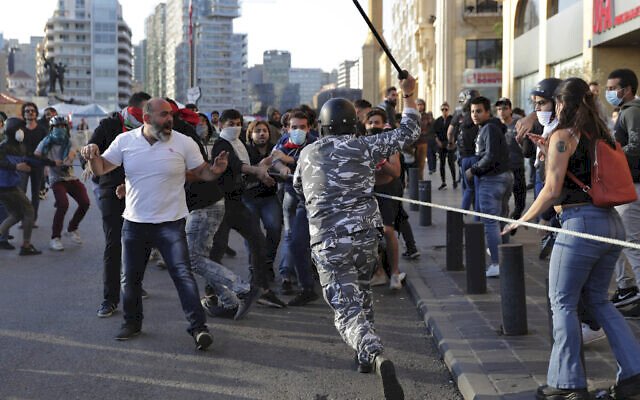Scuffles break out in Beirut as protesters block lawmakers’ path

Scuffles broke out in central Beirut on Tuesday as thousands of anti-government protesters tried to prevent lawmakers from reaching Parliament, outraged that a session was planned even though the country is still without a Cabinet.
When one legislator headed toward the building and could not reach it and turned back, his bodyguards opened fire in the air to clear the way. No one was hurt in the incident.
The house was to meet but the protesters on the streets question the constitutionality of such a session in the absence of a government. An earlier session last Tuesday was postponed amid nationwide protests that have gripped Lebanon since mid-October.
Heavy police and army reinforcements were deployed in downtown Beirut since late Monday to cordon off the area around the parliament.

Hundreds of young protesters thronged around the parliament building, blocking the entrances and vowing to disrupt the session. Some protesters tried to break through the barbed wire, scuffling with riot police, while women protesters tried to form a live barrier between the two sides.
“We are here today because there is a parliament session that is anti-constitutional,” said protester Rania al-Akhras, speaking in English and decrying the ineffectiveness of the legislators. “What they need to be doing is selecting a prime minister and a government.”
Prime Minister Saad Hariri resigned his government on October 29 in response to the protests, which erupted over proposed new taxes but have since snowballed into calls for the government to resign and for the entire political elite that has ruled Lebanon since the end of its 1975-90 civil war to step aside.
President Michel Aoun has not set a date for consultations to select a new prime minister and there are deep divisions between the country’s political powers over the shape of the future Cabinet.
The political deadlock comes as Lebanon is passing through its worst economic and financial crisis in decades. The country, which suffers from widespread corruption, has one of the highest debts in the world, standing at $86 billion or 150% of the GDP.
People pass by out of service ATM machines at a closed bank in the Lebanese capital Beirut, November 12, 2019. (Hassan Ammar/AP)
Lebanon’s bank staff resumed work Tuesday after a week-long strike. New regulations have been imposed that officially limit withdrawals and dollar transfers.
The demonstrators have accused the banks of corruption and mismanagement. The banks first closed when the protests erupted in October but later opened for a week. Depositors then rushed in to withdraw money, but banks had begun imposing informal capital controls that angered many clients and added to the turmoil, prompting the bank employees’ strike.
On Monday, the Banks Association declared formal controls, limiting withdrawals to $1,000 per week, and allowing transfers abroad only for “urgent matters.”

